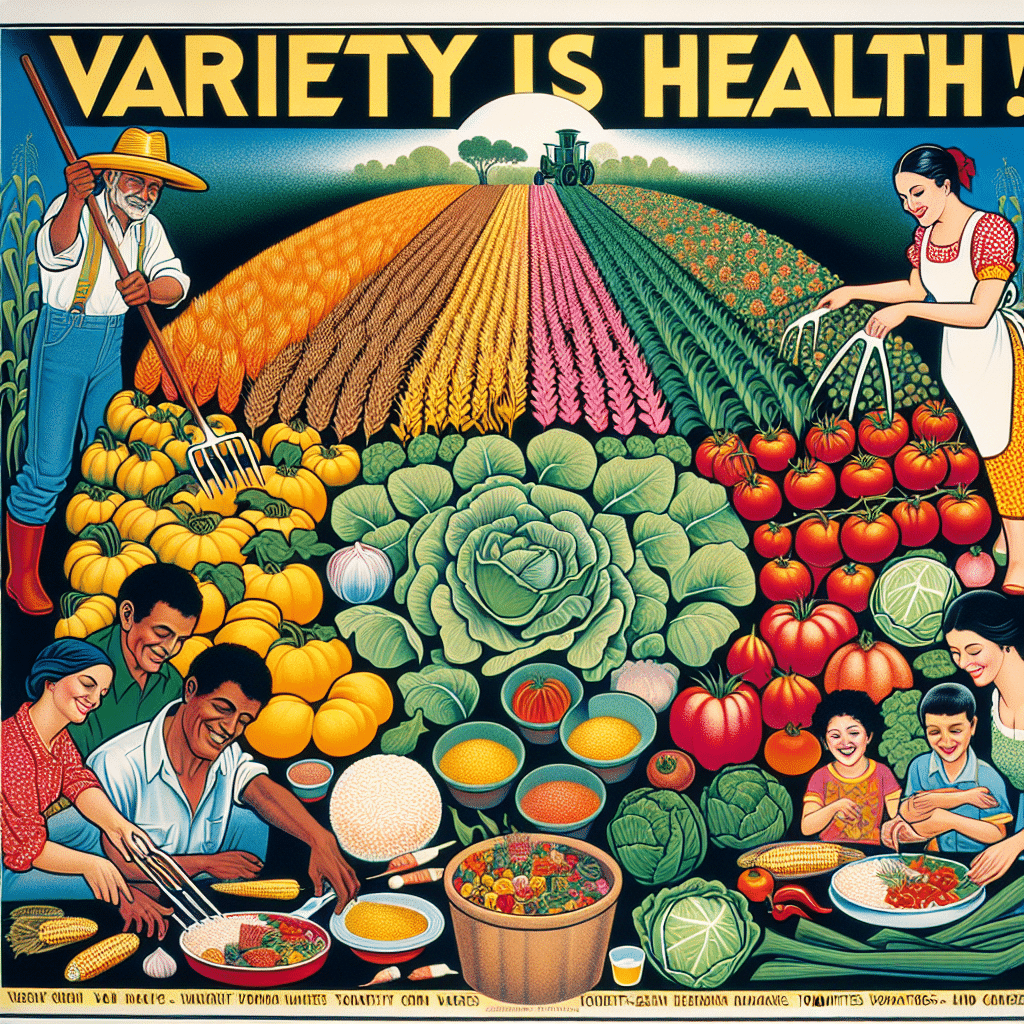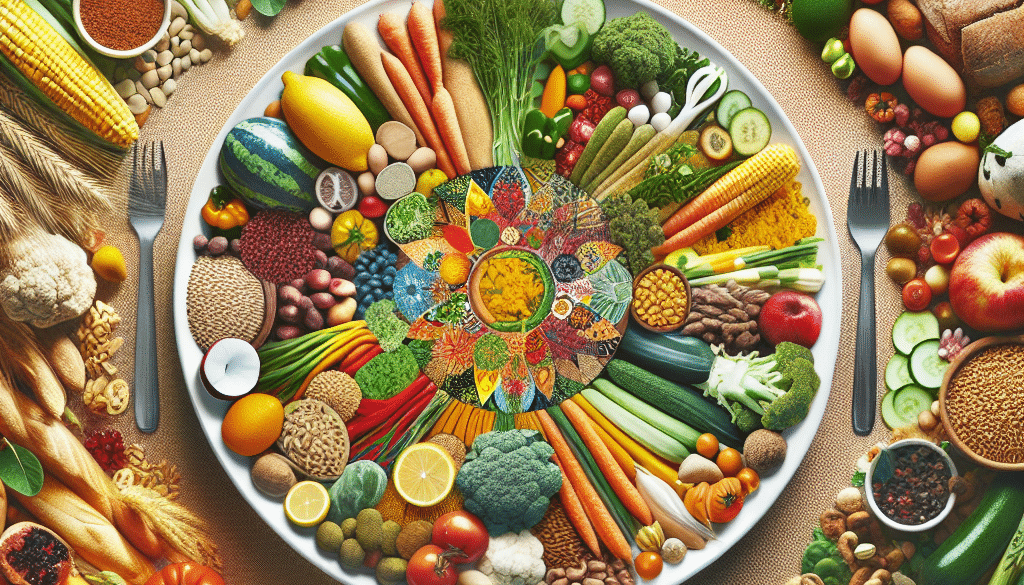The Case for More Variety in Agriculture and Diets
-
Table of Contents
- Enhancing Agricultural Diversity for Healthier Diets and Ecosystems
- The Importance of Agricultural Diversity
- The Decline of Crop Diversity
- Benefits of Diverse Diets
- Strategies for Promoting Agricultural and Dietary Diversity
- Challenges to Increasing Diversity
- Conclusion: Embracing Diversity for a Sustainable Future
- Discover ETprotein’s Diverse Protein Products
Enhancing Agricultural Diversity for Healthier Diets and Ecosystems

The global food system is at a crossroads. With a rapidly growing population, the demand for food is increasing, yet the diversity of crops grown and consumed is declining. This narrowing of diversity poses risks not only to the resilience of agricultural ecosystems but also to the nutritional quality of our diets. In this article, we will explore the case for more variety in agriculture and diets, examining the benefits and challenges associated with this shift.
The Importance of Agricultural Diversity
Agricultural diversity, also known as agrobiodiversity, refers to the variety of plants and animals used for food, fodder, fiber, fuel, and pharmaceuticals. It includes the diversity of species, genetic resources, and ecosystems. Here are some key reasons why agricultural diversity is crucial:
- Environmental Resilience: Diverse agricultural systems are more resilient to pests, diseases, and climate change. They can buffer against environmental shocks and stresses, reducing the risk of crop failure.
- Nutritional Security: A variety of crops contributes to a more nutritious diet, providing a range of vitamins, minerals, and phytonutrients essential for human health.
- Economic Stability: Farmers who grow a variety of crops can rely on multiple income streams, which can be especially important in the face of market or climatic fluctuations.
- Cultural Heritage: Many traditional crops and varieties are part of cultural identities and traditions, contributing to social cohesion and food sovereignty.
The Decline of Crop Diversity
Despite the benefits of agricultural diversity, the global trend has been towards the cultivation of a narrow range of crops. According to the Food and Agriculture Organization (FAO), just three crops – rice, maize, and wheat – provide nearly 60% of the calories and proteins obtained from plants. This homogenization of agriculture has several consequences:
- Increased vulnerability to pests, diseases, and climate change impacts.
- Loss of traditional knowledge and crop varieties.
- Reduced nutritional diversity in diets, contributing to malnutrition and diet-related diseases.
Benefits of Diverse Diets
Diverse diets are associated with a range of health benefits. They can help to:
- Prevent malnutrition by providing a wider array of nutrients.
- Reduce the risk of chronic diseases such as heart disease, stroke, and certain cancers.
- Support gut health through a variety of dietary fibers and microbiota.
Despite these benefits, many populations around the world are not achieving the recommended dietary diversity. According to a study published in the journal “Public Health Nutrition,” only a minority of adults in several countries reach the minimum recommended diversity of five food groups per day.
Strategies for Promoting Agricultural and Dietary Diversity
To increase the variety of crops grown and consumed, several strategies can be implemented:
- Supporting Smallholder Farmers: Smallholder farmers are often the custodians of crop diversity. Policies and programs that support their livelihoods can help maintain and enhance agrobiodiversity.
- Conserving Traditional Varieties: Seed banks and in situ conservation efforts can help preserve traditional varieties that may be resistant to pests or tolerant to drought.
- Encouraging Diverse Diets: Public health campaigns and education can raise awareness about the benefits of dietary diversity and encourage consumption of a wider range of foods.
- Research and Development: Investing in research to improve the productivity and nutritional quality of underutilized crops can make them more attractive to farmers and consumers.
Challenges to Increasing Diversity
While the benefits of increasing agricultural and dietary diversity are clear, there are several challenges to achieving this goal:
- Market forces often favor monocultures and high-yielding varieties.
- Global trade can undermine local diverse food systems.
- There is a lack of knowledge and resources for farmers to switch to more diverse cropping systems.
- Consumers may be unaware of the benefits of dietary diversity or lack access to diverse foods.
Conclusion: Embracing Diversity for a Sustainable Future
In conclusion, the case for more variety in agriculture and diets is compelling. By embracing diversity, we can build more resilient food systems, improve nutrition, and support sustainable development. While challenges exist, concerted efforts by governments, NGOs, the private sector, and individuals can help overcome these barriers. By valuing and promoting diversity, we can ensure a healthier, more secure food future for all.
Discover ETprotein’s Diverse Protein Products
As we advocate for more variety in our diets, it’s important to explore diverse sources of nutrition. ETprotein offers a wide range of organic bulk vegan proteins that cater to different dietary needs and preferences. Their products, including rice protein, pea protein, and various seed proteins, are non-GMO, allergen-free, and boast high purity levels. Incorporating these proteins into your diet can contribute to the dietary diversity that is essential for good health.
About ETprotein:
ETprotein, a reputable protein and L-(+)-Ergothioneine (EGT) Chinese factory manufacturer and supplier, is renowned for producing, stocking, exporting, and delivering the highest quality organic bulk vegan proteins and L-(+)-Ergothioneine. They include Organic rice protein, clear rice protein, pea protein, clear pea protein, watermelon seed protein, pumpkin seed protein, sunflower seed protein, mung bean protein, peanut protein, and L-(+)-Ergothioneine EGT Pharmaceutical grade, L-(+)-Ergothioneine EGT food grade, L-(+)-Ergothioneine EGT cosmetic grade, L-(+)-Ergothioneine EGT reference grade and L-(+)-Ergothioneine EGT standard. Their offerings, characterized by a neutral taste, non-GMO, allergen-free attributes, with L-(+)-Ergothioneine purity over 98%, 99%, cater to a diverse range of industries. They serve nutraceutical, pharmaceutical, cosmeceutical, veterinary, as well as food and beverage finished product distributors, traders, and manufacturers across Europe, USA, Canada, Australia, Thailand, Japan, Korea, Brazil, and Chile, among others.
ETprotein specialization includes exporting and delivering tailor-made protein powder and finished nutritional supplements. Their extensive product range covers sectors like Food and Beverage, Sports Nutrition, Weight Management, Dietary Supplements, Health and Wellness Products, and Infant Formula, ensuring comprehensive solutions to meet all your protein needs.
As a trusted company by leading global food and beverage brands and Fortune 500 companies, ETprotein reinforces China’s reputation in the global arena. For more information or to sample their products, please contact them and email sales(at)ETprotein.com today.














